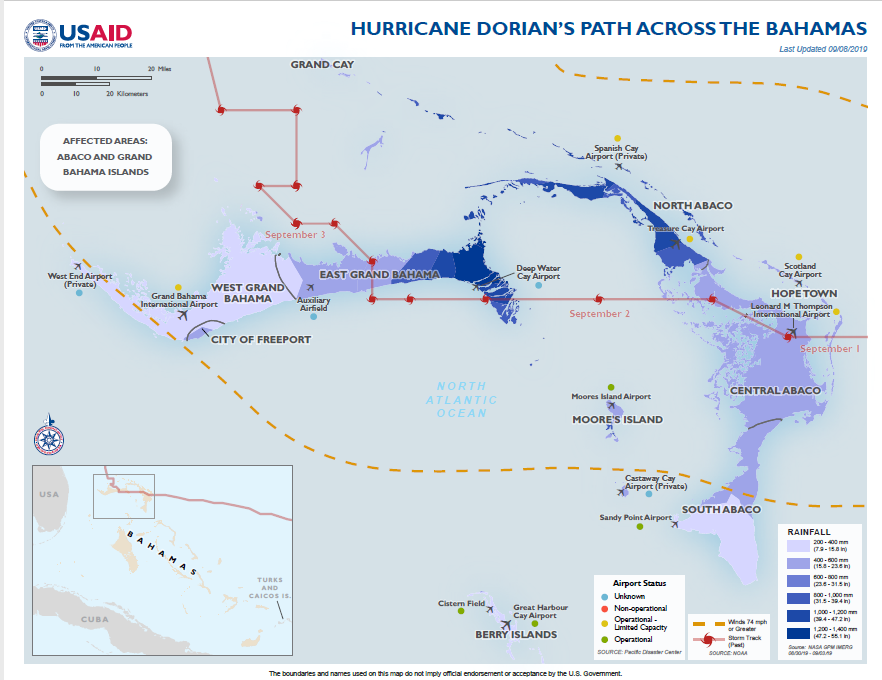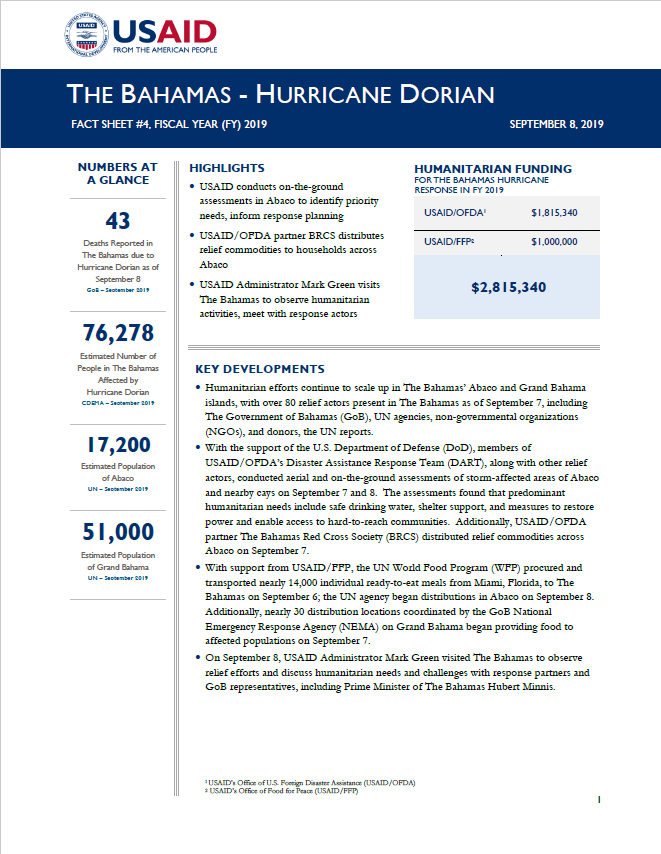- What We Do
- Agriculture and Food Security
- Democracy, Human Rights and Governance
- Economic Growth and Trade
- Education
- Environment and Global Climate Change
- Gender Equality and Women's Empowerment
- Global Health
- Humanitarian Assistance
- Transformation at USAID
- Water and Sanitation
- Working in Crises and Conflict
- U.S. Global Development Lab
Speeches Shim
September 8, 2019
Highlights
USAID conducts on-the-ground assessments in Abaco to identify priority needs, inform response planning
USAID/OFDA partner BRCS distributes relief commodities to households across Abaco
USAID Administrator Mark Green visits The Bahamas to observe humanitarian activities, meet with response actors
The Bahamas - Hurricane Dorian Map #4, (FY) 2019 ![]() (pdf - 812k)
(pdf - 812k)
Numbers At A Glance
43
76,278
17,200
51,000
Humanitarian Funding
FOR THE BAHAMAS HURRICANE RESPONSE IN FY 2019
| USAID/OFDA | $1,815,340 |
| USAID/FFP | $1,000,000 |
| TOTAL | $2,815,340 |
Key Developments
Humanitarian efforts continue to scale up in The Bahamas’ Abaco and Grand Bahama islands, with over 80 relief actors present in The Bahamas as of September 7, including The Government of Bahamas (GoB), UN agencies, non-governmental organizations (NGOs), and donors, the UN reports.
With the support of the U.S. Department of Defense (DoD), members of USAID/OFDA’s Disaster Assistance Response Team (DART), along with other relief actors, conducted aerial and on-the-ground assessments of storm-affected areas of Abaco and nearby cays on September 7 and 8. The assessments found that predominant humanitarian needs include safe drinking water, shelter support, and measures to restore power and enable access to hard-to-reach communities. Additionally, USAID/OFDA partner The Bahamas Red Cross Society (BRCS) distributed relief commodities across Abaco on September 7.
With support from USAID/FFP, the UN World Food Program (WFP) procured and transported nearly 14,000 individual ready-to-eat meals from Miami, Florida, to The Bahamas on September 6; the UN agency began distributions in Abaco on September 8. Additionally, nearly 30 distribution locations coordinated by the GoB National Emergency Response Agency (NEMA) on Grand Bahama began providing food to affected populations on September 7.
On September 8, USAID Administrator Mark Green visited The Bahamas to observe relief efforts and discuss humanitarian needs and challenges with response partners and GoB representatives, including Prime Minister of The Bahamas Hubert Minnis.
CURRENT SITUATION
To date, the GoB has confirmed 43 storm-related deaths, including 35 in Abaco and eight in Grand Bahama; the GoB anticipates the death toll to rise as search-and-rescue (SAR) operations continue. The GoB Ministry of Health (MoH) has secured temporary cold storage for deceased persons for Abaco but may require additional facilities for Grand Bahama.
Recent assessments conducted by NEMA, UN agencies, and other relief actors in Abaco and Grand Bahama indicate that immediate needs across the islands include debris removal, support to restore electricity and telecommunication services, and access to safe drinking water, the UN reports. Additional assessments are ongoing, including to isolated areas initially inaccessible to relief actors.
Water sources in Abaco and surrounding cays sustained significant damage due to Hurricane Dorian, according to the Pacific Disaster Center (PDC). As of September 7, water wells in Abaco’s towns of Marsh Harbour and Spring City remained flooded, while a 500,000-gallon water storage tank and sewage infrastructure in central Abaco’s Treasure Cay were destroyed. In Grand Bahama, two of the three water pump stations assessed by PDC had sustained some damage, though repairs were ongoing. The PDC notes that measures are urgently needed to mitigate the impact of salt water contamination of water wells
Technical teams from The Bahamas Telecommunications Company continue work to restore telecommunication services across the islands, with mobile services restored in some areas of Abaco and Grand Bahama by September 7, the PDC reports. As of the same day, nearly 90 percent of power infrastructure remained damaged in northern Abaco, while electricity was largely restored in central and southern Abaco.
NATIONAL AND INTERNATIONAL RESPONSE
The GoB-led humanitarian response in The Bahamas continues to scale up, with more than 80 stakeholders engaged in response activities as of September 7, according to the UN. The UN also activated a UN Disaster Assessment and Coordination (UNDAC) team on September 7; the UNDAC team plans to establish an operations center in Abaco to coordinate relief activities alongside local officials, with technical assistance from USAID-supported SAR personnel and a member of the DART.
On September 7, NEMA established a processing center at an airport near The Bahamas’ capital city of Nassau to connect evacuees displaced by Hurricane Dorian with relief actors providing family reconciliation services and emergency accommodations. By September 8, several actors, including the GoB Ministry of Transport and Local Government and the Bahamas Paradise Cruise line, had evacuated approximately 3,000 people from affected islands, according to local media.
Nearly 30 food distribution locations on Grand Bahama commenced operations on September 7, NEMA reports. Royal Caribbean International delivered 10,000 meals to Grand Bahama’s Freeport town on September 6, coordinating with NEMA to distribute the meals to affected populations. In addition, the NGO World Central Kitchen, led by Washington, D.C.-based chef José Andrés, provided 20,000 meals to affected populations in Abaco and Grand Bahama on September 7, as well as to evacuees and first responders in Nassau.
A UN Children’s Fund (UNICEF) team of experts in emergency communications, child protection, and water, sanitation, and hygiene (WASH) began conducting field assessments in Abaco on September 7. On the same day, an International Federation of the Red Cross vessel transported UNICEF WASH supplies, including water disinfection tablets sufficient to provide safe drinking water for 9,500 people, collapsible water tanks with capacity to support more than 1,900 people, and 1,000 water containers, to Nassau for onward distribution to affected communities. UNICEF continues to engage with the GoB Ministry of Education to assess and plan for the needs of the approximately 18,000 children estimated to be impacted by Hurricane Dorian.
The Pan American Health Organization (PAHO) issued an initial funding appeal on September 7, requesting $3.5 million to support the delivery of health and WASH assistance, including vector control activities, for the next six months. The UN agency’s prioritized response interventions include coordination of emergency medical teams (EMTs); restoring access to essential health services, safe drinking water, and sanitation facilities; ensuring proper waste management and vector control; and increasing epidemiological surveillance to support early detection and timely management of communicable disease outbreaks. To this end, PAHO is coordinating with other relief actors to restore power, communication systems, and distribution chains; replace damaged or destroyed stocks of essential medicines; and provide increased storage facilities.
PAHO also highlighted that additional health personnel, including specialist physicians and mental health professionals, would likely be needed in the coming weeks to support response efforts and relieve health care workers currently sustaining the delivery of health care. Efforts are already underway to augment health worker capacity; by September 7, the MoH had dispatched two local health surge teams and coordinated the deployment of three international EMTs to Abaco and Grand Bahama, with an additional two EMTs planning to deploy in the coming days. In addition, PAHO has sent a 14-person team to The Bahamas to support logistics, civil-military coordination, information managements, epidemiological surveillance, and other critical functions.
USG RESPONSE
The 57-member USAID-supported SAR team established a base of operations in Marsh Harbour on September 7 and commenced SAR missions to surrounding cays on September 8. Using DoD helicopters, the SAR team searched, assessed, and cleared 125 structures on central Abaco’s Cherokee Sound town and Elbow Cay; the team also rescued 22 people from the two locations and transported them to Marsh Harbour. Missions to additional areas of Abaco and surrounding cays will continue over the coming days.
Two DoD helicopters transported teams comprising staff from UN agencies, NGOs, and the DART to conduct on-the-ground and aerial assessments of hard-to-reach affected areas in the Abaco island group on September 7. In northern Abaco’s Cooper’s Town, the team identified the need for generators, safe drinking water, and shelter materials, while in central Abaco’s Treasure Cay area, the teams noted a lack of fuel for transporting relief items.
The U.S. Coast Guard (USCG) continues to conduct operations based out of The Bahamas’ Andros Island, including SAR missions, aerial assessments, logistical support, and transportation of relief supplies. As of September 8, the USCG had rescued 308 people from storm-impacted areas. Additionally, a six-person USCG Incident Management Assist Team—comprised of experts in disaster management and response—is embedded within the NEMA emergency operations center to provide operational support.
With USAID/OFDA support, the BRCS distributed 300 hygiene kits and 600 water containers to people in Abaco on September 7. The BRCS plans to meet the basic needs of an estimated 3,500 households across Abaco and Grand Bahama initially, and will coordinate with NEMA to assess and plan for additional response activities in the coming days.
Administrator Green visited The Bahamas on September 8 to observe ongoing emergency efforts and meet with GoB authorities, including Prime Minister Minnis, as well as NGOs and UN agencies active in the response. Administrator Green joined a DoD-operated flight to observe broader damage across the affected islands. In Marsh Harbour, Administrator Green met with the USAID-deployed SAR team at their base of operations, where he expressed support for interagency collaboration to provide life-saving assistance in the wake of Hurricane Dorian.
CONTEXT
From September 1 to 2, Hurricane Dorian made landfall over Abaco and Grand Bahama as a Category 5 storm on the Saffir-Simpson Hurricane Wind Scale, bringing sustained winds of approximately 180 miles per hour, heavy rains, and storm surges of up to 23 feet to the islands.
As a result of widespread flooding and destruction to infrastructure caused by Hurricane Dorian, U.S. Chargé d’Affaires Stephanie Bowers declared a disaster in The Bahamas on September 2. In response, USAID/OFDA provided an initial $200,000 to The Bahamas Red Cross Society and rapidly activated a DART and Response Management Team (RMT). USAID/OFDA is also coordinating with the USCG, part of the U.S. Department of Homeland Security; the U.S. Department of Defense; and the GoB to swiftly deliver emergency relief items to populations in The Bahamas most severely affected by the hurricane.
PUBLIC DONATION INFORMATION
The most effective way people can assist relief efforts is by making cash contributions to humanitarian organizations that are conducting relief operations. A list of humanitarian organizations that are accepting cash donations for disaster responses around the world can be found at www.interaction.org.
USAID encourages cash donations because they allow aid professionals to procure the exact items needed (often in the affected region); reduce the burden on scarce resources (such as transportation routes, staff time, and warehouse space); can be transferred very quickly and without transportation costs; support the economy of the disaster-stricken region; and ensure culturally, dietarily, and environmentally appropriate assistance.
More information can be found at: USAID Center for International Disaster Information: www.cidi.org/hurricane-dorian/ or +1.202.661.7710. Information on relief activities of the humanitarian community can be found at http://www.reliefweb.int.



Comment
Make a general inquiry or suggest an improvement.